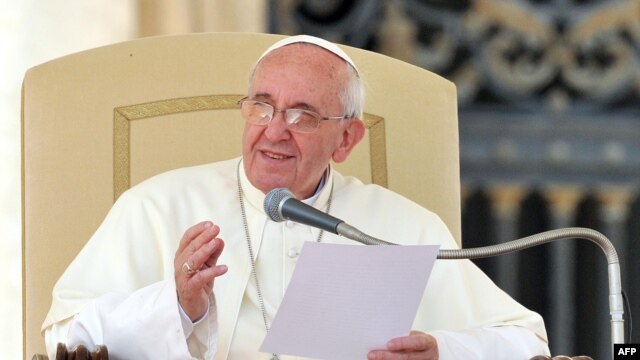Pope uses 'genocide' to describe Armenian killings
| Publisher | Radio Free Europe/Radio Liberty |
| Publication Date | 12 April 2015 |
| Cite as | Radio Free Europe/Radio Liberty, Pope uses 'genocide' to describe Armenian killings, 12 April 2015, available at: https://www.refworld.org/docid/5565b9ec9.html [accessed 19 May 2023] |
| Disclaimer | This is not a UNHCR publication. UNHCR is not responsible for, nor does it necessarily endorse, its content. Any views expressed are solely those of the author or publisher and do not necessarily reflect those of UNHCR, the United Nations or its Member States. |
April 12, 2015
By RFE/RL
 Pope Francis (file photo)
Pope Francis (file photo)
Pope Francis has called the mass killing of Armenians by Ottoman soldiers during World War I "genocide" at a Sunday mass where he marked the 100th anniversary of the tragedy.
The pope said during the service at St. Peter's Basilica, "In the past century our human family had lived through three massive and unprecedented tragedies. The first, which is widely considered 'the first genocide of the 20th century,' struck your own Armenian people."
Francis was citing part of a statement from John Paul II and the Armenian patriarch in 2000.
The pope was joined by Armenian Patriarch Nerses Bedros XIX Tarmouni at the April 12 mass, which included elements of the Armenian Catholic rite.
Armenian President Serzh Sarkisian was reportedly also in attendance.
Pope Francis's use of the term "genocide" is certain to anger Turkey, which has admitted Armenians were killed in large numbers but always added that hundreds of thousands of Turks were also killed during the bloodshed 100 years ago.
The Foreign Ministry summoned the Vatican's envoy in Ankara, and then announced it was recalling its own ambassador to the Vatican for consultations.
The ministry said Ankara had felt "great disappointment and sadness" over the pope's remarks.
It accused the pope of engaging in a "one-sided narrative" that ignored the suffering of Muslims and other religious groups.
It also said the pope's comments "contradicted his message of peace, reconciliation, and dialogue" made during his landmark visit to Turkey last November.
Divisive Issue
Armenia says some 1.5 million ethnic Armenians were slaughtered between 1915 and 1917 as the Ottoman Empire was falling apart.
Armenia has been campaigning for years to win international recognition of the mass killing as genocide.
Several European countries have officially recognized the massacre as genocide. The United States has not followed, although 44 individual states have recognized the events as genocide and Republican and Democratic lawmakers have introduced a resolution urging President Barack Obama to recognize the Armenian deaths as a genocide.
Armenia officially marks the anniversary of the killings on April 24.
The pope said the other two genocides of the last 100 years were "perpetrated by Nazism and Stalinism" but he also mentioned "more recently there have been other mass killings, like those in Cambodia, Rwanda, Burundi, and Bosnia."
The pontiff added, "It seems that humanity is incapable of putting a halt to the shedding of innocent blood."
During the special mass, Francis declared the revered Armenian mystic St. Gregory of Narek a doctor of the church.
Only 35 people have been given the title, which is reserved for those whose writings have greatly served the universal church.
Gregory, who lived around 950 to 1005, is considered one of the most important figures of medieval Armenian religious thought and literature.
With reporting by AFP, AP and BBC
Link to original story on RFE/RL website
